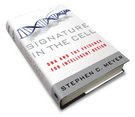What a Difference a Year Makes: Signature in the Cell Now Available in Paperback
Several years in the making, the book arrives just as the information age is coming to biology and scientists are delving deeper into the mystery of the origins of life. In Signature in the Cell Dr. Meyer lays out a radical new and comprehensive argument for intelligent design that readers will likely never have encountered before, and which materialist scientists cannot counter.
 That was written in this space exactly one year ago today when Signature in the Cell: DNA and Evidence for Intelligent Design arrived in book stores and since then has been named a Times Literary Supplement Book of the Year, an Amazon.com best-selling science book and began to change the shape of the debate over intelligent design. Now, it is available in paperback.
That was written in this space exactly one year ago today when Signature in the Cell: DNA and Evidence for Intelligent Design arrived in book stores and since then has been named a Times Literary Supplement Book of the Year, an Amazon.com best-selling science book and began to change the shape of the debate over intelligent design. Now, it is available in paperback.
Since it’s publication some things have changed and some haven’t.
One thing that hasn’t changed is that materialist scientists still cannot counter Meyer’s information-rich argument for intelligent design. Precious few have had the guts to read the book, and fewer still will challenge it publicly. The challengers have completely failed to rebut Meyer, and have been largely ineffective in persuading people that they have any substantive response to the issues that are raised in SITC. Like Darwin’s Black Box, The Design Inference, and The Privileged Planet before it, SITC has advanced the case for intelligent design in ways that materialists and ID skeptics just can’t answer.
As we’ve pointed out before,
critics of intelligent design often try to dismiss the theory as not worth addressing, as a question already settled, even as being too boring to countenance. Then they spend an amazing amount of energy trying to refute it.
So, to defend the ideas in SITC, last month we produced the digital book Signature of Controversy which has already been downloaded 6,300 times. SOC is an anthology of essays responding to criticism of SITC by such noted writers as David Berlinski, Jay Richards, Richard Sternberg and others. A second, updated and expanded edition will be available later this year.
Contrary to what you might think, the majority of responses to SITC have been positive. In December, World magazine named Stephen Meyer as their person of the year due in large part to the publication of SITC. Positive reviews have appeared in a wide variety of publications from The American Spectator to The Journal of the International Society of Philosophical Enquiry to the Midwest Book Review. And, more on the way in the next few months.
Similarly, in the past year a number of prominent scientists and scholars have endorsed the book.
- Dr. Philip S. Skell, National Academy of Sciences and Evan Pugh Professor at Pennsylvania State University, emeritus
- Dr. Norman C. Nevin, OBE, BSc, MD, FFPH, FRCPath, FRCP (Edin), FRCP
Emeritus Professor in Medical Genetics, Queen’s University, Belfast - Dr. Scott Turner, Environmental and Forest Biology, State University of New York
- Alastair Noble, Ph.D. chemistry, former BBC Education Officer and Her Majesty’s Inspector of Schools for Science, Scotland
- Dr. James Le Fanu, author of Why Us? How Science Rediscovered the Mystery of Ourselves
Overall, Signature in the Cell has been a stunning success, not least because it has got all the Darwinists contorting themselves into knots trying to dismiss its evidence based arguments. Seeing them lose so much sleep over a book they claim doesn’t matter is rich.
